Everspin Technologies reported its financial results for Q2 2023
Everspin Technologies its financial results for Q2 2023 - with revenues of $15.7 (up 7% compared to 2022), a net income of $3.9 million, and positive cash flow of $3.9 million (which includes a tax credit refund of $2 million). At the end of the quarter, cash and cash equivalents were $30.8 million
The company says that its product backlog into 2024 continues to be high, but the company is experiencing some headwinds from the semiconductor downturn.
Avalanche announces pre-production of its Gen-3 Space Grade Dual QSPI STT-MRAM solution for advanced SoCs and FPGAs
pMTJ STT-MRAM developer Avalanche Technology announced that its Gen-3 Space Grade Dual QSPI solution is now available in pre-production.
The devices are based on the company's latest generation STT-MRAM technology. Avalanche says that the new devices offer significant density, endurance, reliability, and power benefits, over existing memory solutions for aerospace and defense applications, particularly for easily configuring advanced SoCs and FPGAs, which are known to present complex design challenges.
Hprobe releases a new MRAM testing module to help increase production yields
Hprobe, a developer of testing equipment for magnetic devices, announced a new addition to its product line, the RF Pulse Module. The company says that this is the commercially available testing system to both collect statistics of error rate of the memory unit cell and take a deep look into switching dynamics of resistive memories.
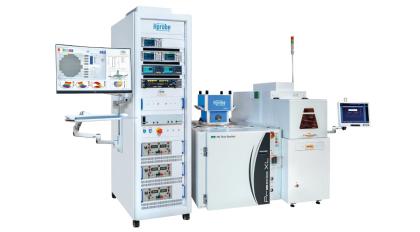
Hprobe's IBEX system
Hprobe says that the RF Pulse Module is two orders of magnitude faster than existing devices and can help increase manufacturing yields. Hprobe has already begun shipping to tier-1 companies and major research institutes around the world.
Everspin to build a new MRAM production line in Indiana, hopes to secuire government support
Earlier this year, Everspin Technologies announced that it aims to build a new production line in the state of Indiana, US, that will increase Everspin's production capacity for both Toggle MRAM and STT-MRAM. The company is working with state and federal government sources to secure funding for the new production line.
Everspin says it also plans to work with the local research community to enhance domestic research for MRAM technology development, creating a Technology Development Center at the proposed Indiana-based location. Everspin says that it is the only US-based commercial manufacturer of MRAM devices today, and increasing its capacity in the US is of strategic importance to its commercial and US Government partners.
Everspin reported its financial results for Q3 2022
Everspin Technologies announced reported its financial results for Q3 2022, with revenues of $15.2 million (close to the end of its guidance, and up 3% from last year) and a net income of $1.9 million.
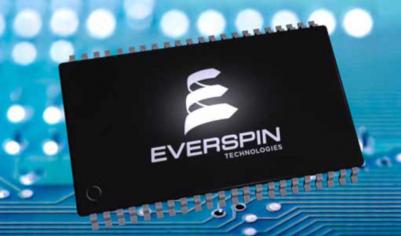
Everspin says that its product backlog remains strong, but customer inventory adjustments will have an impact on the backlog in coming quarters. The company continues to relieve its supply chain constraints, which is helping to address its unfulfilled toggle MRAM demand.
Everspin's latest EMxxLX STT-MRAM devices are commercially available
Earlier this year, Everspin Technologies announced its latest STT-MRAM devices, the EMxxLX xSPI serial interface memory. The company now announced that the EMxxLX devices are now commercially available.
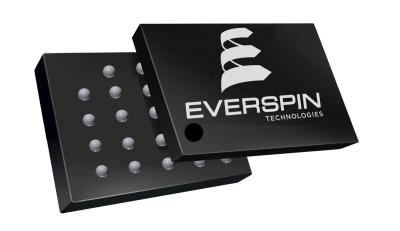
The EMxxLX family is the only memory device offering density up to 64Mb, octal interface with 400MB/s bandwidth, and compatibility with the xSPI standard. The EMxxLX features 1000X faster write times compared to NOR flash.
Disclosure: the author of this post holds shares at Everspin
Avalanche Technology announced production of its 3rd-Gen 22nm MRAM devices
pMTJ STT-MRAM developer Avalanche Technology announced that its latest 3rd-Gen MRAM devices are now in production at its foundry partner, United Microelectronics Corporation (UMC). The company says that its new MRAM chips offer significant density, endurance, reliability and power benefits over existing non-volatile solutions.
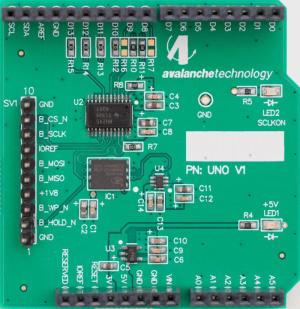
Avalanche's new Parallel x 32 series is offered as a standard product in various density options and has asynchronous SRAM-compatible read/write timings. Avalanche also says that it will soon start developing 16Gb MRAM chips.
Everspin reported its financial results for Q2 2022
Everspin Technologies announced its financial results for Q2 2022, with revenues of $14.71 million (up 24% from Q2 2021) and a net profit of $1.7 million . The company's had a positive cash flow of $4.3 million (up from a negative cash flow of $600,000 last year). At the end of the quarter Everspin had $23.1 million in cash and equivalents.
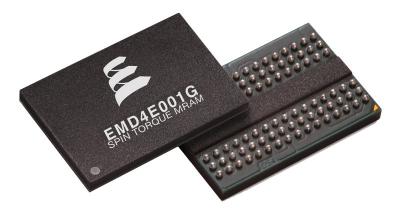
Everspin expects that industry supply constraints will limit supply, and the company reduces its forecast for Q3 2022 - with revenues seen to be in the range of $14.4 million to $15.4 million. Everspin says that price increases from its suppliers and expenses related to 28nm STT-MRAM development will reduce its earnings next quarter and the company will be breakeven or with a small profit.
Everspin announces a new 128Mbit xSPI STT-MRAM product
A few months ago, Everspin Technologies launched a new family of SPI/QSPI/xSPI interface MRAM products that offer the world's highest performance persistent memory with full read and write bandwidth of 400 Megabytes per second through the new JEDEC expanded Serial Peripheral Interface (xSPI) standard interface. The EMxxLX family was launched with densities ranging from 8 Mbit to 64 Mbit.

Today Everspin announced a new xSPI MRAM device, the EM128LX, that expands the product line to 128Mbit. Everspin says that the combination of increased density with up to 233 megabytes/second full read and write bandwidth means that system designers now have the option of merging code and data memory on the same device, reducing cost, power, and area.
ITRI joins forces with TSMC and NYCU to develop next-gen MRAM technologies
Taiwan's Industrial Technology Research Institute (ITRI) announced two new MRAM collaborations. The first one is with Taiwan's TSMC, for the development of SOT-MRAM array chips. The second collaboration is with National Yang Ming Chiao Tung University (NYCU) to develop magnetic memory technology that can perform across a wide operating temperature range of nearly 400 degrees Celsius.
Together with TSMC, ITRI is developing low-voltage and current SOT-MRAM, that features high write efficiecny and low write voltage. ITRI says that its SOT-MRAM achieves a writing speed of 0.4 nanoseconds and a high endurance of 7 trillion reads and writes. The memory also offers a data storage lifespan of over 10 years.
Pagination
- Previous page
- Page 2
- Next page


